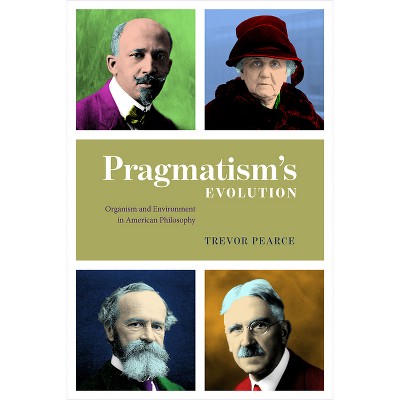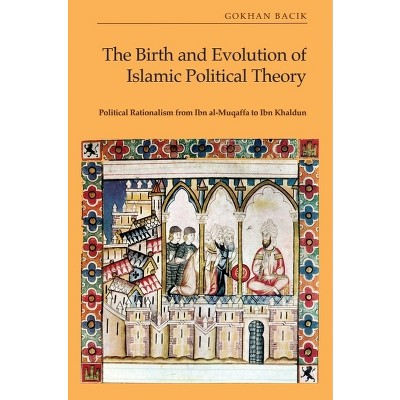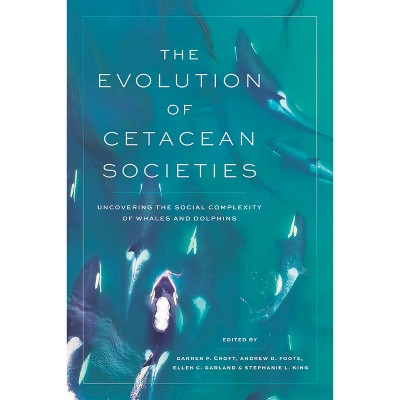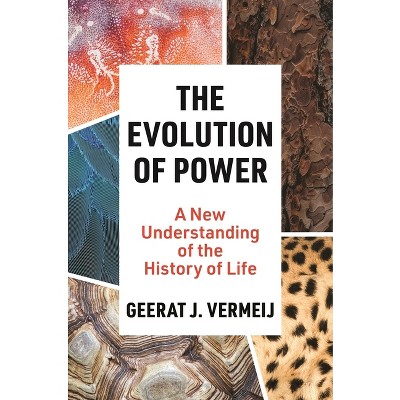Sponsored

The Evolution of Pragmatism in India - by Scott R Stroud (Paperback)
$29.00
In Stock
Eligible for registries and wish lists
Sponsored
About this item
Highlights
- "A magnificent study" (New York Review of Books) of how the Indian reformer Bhimrao Ambedkar reimagined John Dewey's pragmatism.
- About the Author: Scott R. Stroud is associate professor of communication studies at the University of Texas at Austin.
- 320 Pages
- Language + Art + Disciplines, Rhetoric
Description
About the Book
"The story of how the Indian reformer Bhimrao Ambedkar reimagined John Dewey's pragmatism. In The Evolution of Pragmatism in India, Scott R. Stroud delivers a comprehensive exploration of the influence of John Dewey's pragmatism on Bhimrao Ambedkar, architect of the Republic of India's constitution. Stroud traces Ambedkar's development in Dewey's Columbia University classes in 1913-1916 through his final years in 1950s India when he rewrote the story of Buddhism. Stroud examines pragmatism's influence not only on the philosophical ideas underpinning Ambedkar's fight against caste oppression but also how his persuasive techniques drew on pragmatism's commitment to reconstruction and meliorism. At the same time, Stroud is careful to point out the ways that Ambedkar pushed back against Dewey's paradigm and developed his own approach to challenges in India. The result is a nuanced study of one of the most important figures in Indian history"--Book Synopsis
"A magnificent study" (New York Review of Books) of how the Indian reformer Bhimrao Ambedkar reimagined John Dewey's pragmatism. In The Evolution of Pragmatism in India, Scott R. Stroud delivers a comprehensive exploration of the influence of John Dewey's pragmatism on Bhimrao Ambedkar, architect of the Republic of India's constitution. Stroud traces Ambedkar's development in Dewey's Columbia University classes in 1913-1916 through his final years in 1950s India when he rewrote the story of Buddhism. Stroud examines pragmatism's influence not only on the philosophical ideas underpinning Ambedkar's fight against caste oppression but also how his persuasive techniques drew on pragmatism's commitment to reconstruction and meliorism. At the same time, Stroud is careful to point out the ways that Ambedkar pushed back against Dewey's paradigm and developed his own approach to challenges in India. The result is a nuanced study of one of the most important figures in Indian history.Review Quotes
"In tracing the uptake of Dewey's philosophy into Bhimrao Ambedkar's lifelong, high-stakes negotiation against India's caste system and, eventually, his work as a chief architect of India's Constitution, Stroud provides his readers what, to my mind, is the greatest revelation about-and possibly the biggest argument for the efficacy of-American pragmatism yet this century, one that will serve as a key text for thinking through pragmatism's evolving commitments from a rhetorical vantage."-- "Rhetoric Society Quarterly"
"Stroud's work is rigorously researched and exceptionally executed. When it comes to archival and argumentative integrity, Stroud exceeds expectations. His book offers a sophisticated balance of meticulous detail with impressive scope. What I appreciate most, however, is the relevance of his work for contemporary exigencies in rhetorical studies. I am always grateful when scholarship transcends its raw materials in a specific historic or geographic context and yields rich conceptual utility for other situations."-- "Rhetoric & Public Affairs"
"By embedding Dr. B.R. Ambedkar's brilliant, scathing, and context-specific rhetorical strategies within a broader universe of humanistic debate, [Stroud] seeks to bring anticaste views to bear on expansive and pluriversal conceptualizations of knowledge, society, government and the use of force. . . . Stroud's greatest contribution to the Ambedkarite discourse might well be a timely resuscitation of Ambedkar's intellectual nimbleness, freethinking, and doggedly nonideological assessments of problems."-- "South Asia Multidisciplinary Academic Journal"
"The most anticipated scholarly treatment of Ambedkar's philosophy, among the half dozen or so books that have been published in . . . years."-- "Pragmatism Today"
"A book of philosophy and of intellectual history. . . The Evolution of Pragmatism in India will be the definitive account of Ambedkar and Dewey for a very long time."-- "Journal of Buddhist Philosophy"
"The story of pragmatism is often framed as a distinctly American one, with minor forays and moments of appreciation in Europe and elsewhere. The Evolution of Pragmatism in India helps to revise and reframe that hoary narrative. Stroud, associate professor of communication at the University of Texas at Austin, offers an illuminating exploration of an under-examined figure in pragmatism's variegated history."-- "Philosophy in Review"
"A magnificent study of Ambedkar's complex engagement with Dewey's ideas, which he reworked to address India's specific political and social conditions."-- "New York Review of Books"
"The book is indeed very persuasive that to fully understand Ambedkar, one must understand his relationship with Dewey. . . . it is hard to imagine a more careful and compelling exploration."-- "LSE Review of Books"
"A work of scholarship that shows the global relevance of pragmatism in the 20th Century introduces the fascinating philosophy of Ambedkar to a non-Indian audience, and provides an entry for further scholarship on this profound thinker and activist. . . . Stroud's book is groundbreaking."-- "Transactions of the Charles S. Peirce Society"
"Ambedkar's intellectual inheritance has been delved into like seldom before. . . . The significance of the text must be considerable within both Ambedkarite scholarship and in other disciplines which seek to look into the various issues of social conflict/cohesion and understand them in terms of socio-political operations of force."-- "Journal of Comparative Literature and Aesthetics"
"Ambedkar was one of the greatest legal and political thinkers of the twentieth century, but his thought is barely known in the United States. With wide-ranging research and insightful philosophical probing, Stroud shows that Ambedkar, using Dewey's works as a fulcrum, created a distinctive form of Buddhist pragmatism, committed to meliorist social dialogue, non-anger, and the flexible pursuit of social democracy. A major achievement."--Martha C. Nussbaum, University of Chicago
"In this carefully researched and skillfully presented work, Stroud examines Ambedkar's adoption of a revivified Buddhism and Dewey's pragmatism as tools for his struggle against the Hindu caste system. By expanding our understanding of the global potentials of pragmatism, Stroud has made a major contribution to East-West scholarship."--Larry A. Hickman, Center for Dewey Studies
"In this meticulously researched book, Stroud positions Ambedkar's engagement with Dewey's thought as a defining moment in the global history of American pragmatism. The Evolution of Pragmatism in India is a major contribution to Ambedkar studies, which enlarges our methodological repertoire for approaching this foundational thinker of caste inequality."--Anupama Rao, Columbia University
"Stroud's in-depth exploration of the influence of Dewey's pragmatism on Ambedkar's thought not only allows us to comprehend the positions that Ambedkar took but also, equally, to appreciate the compromises he made in his policy engagement for Dalit empowerment from 1919 to 1956."--Sukhadeo Thorat, Jawaharlal Nehru University, Indian Institute of Dalit Studies
About the Author
Scott R. Stroud is associate professor of communication studies at the University of Texas at Austin. He is the author of John Dewey and the Artful Life and Kant and the Promise of Rhetoric.Dimensions (Overall): 9.0 Inches (H) x 6.0 Inches (W) x .7 Inches (D)
Weight: 1.01 Pounds
Suggested Age: 22 Years and Up
Number of Pages: 320
Genre: Language + Art + Disciplines
Sub-Genre: Rhetoric
Publisher: University of Chicago Press
Format: Paperback
Author: Scott R Stroud
Language: English
Street Date: March 17, 2023
TCIN: 1006098973
UPC: 9780226824321
Item Number (DPCI): 247-46-3709
Origin: Made in the USA or Imported
If the item details aren’t accurate or complete, we want to know about it.
Shipping details
Estimated ship dimensions: 0.7 inches length x 6 inches width x 9 inches height
Estimated ship weight: 1.01 pounds
We regret that this item cannot be shipped to PO Boxes.
This item cannot be shipped to the following locations: American Samoa (see also separate entry under AS), Guam (see also separate entry under GU), Northern Mariana Islands, Puerto Rico (see also separate entry under PR), United States Minor Outlying Islands, Virgin Islands, U.S., APO/FPO
Return details
This item can be returned to any Target store or Target.com.
This item must be returned within 90 days of the date it was purchased in store, shipped, delivered by a Shipt shopper, or made ready for pickup.
See the return policy for complete information.
Frequently bought together
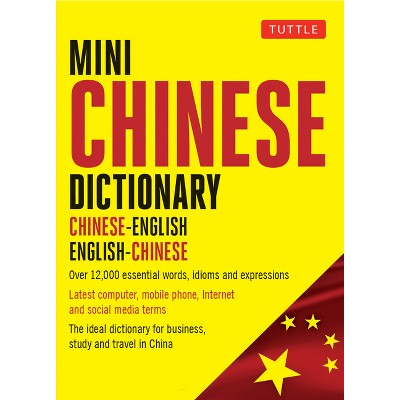
$5.77
MSRP $6.99
Buy 2, get 1 free select books, music & movies
5 out of 5 stars with 1 ratings

$11.00
MSRP $18.99
Buy 2, get 1 free select books, music & movies
5 out of 5 stars with 1 ratings
Trending Non-Fiction

$19.31
was $20.98 New lower price
Buy 2, get 1 free select books, music & movies
4 out of 5 stars with 59 ratings

$19.58
MSRP $29.00
Buy 2, get 1 free select books, music & movies
4.6 out of 5 stars with 13 ratings

$4.59
MSRP $7.99
Buy 2, get 1 free select books, music & movies
4.8 out of 5 stars with 119 ratings

$6.20
MSRP $10.95
Buy 2, get 1 free select books, music & movies
4.8 out of 5 stars with 33 ratings

$7.09
MSRP $9.99
Buy 2, get 1 free select books, music & movies
4.9 out of 5 stars with 46 ratings

Highly rated
$12.54
MSRP $22.00
Buy 2, get 1 free select books, music & movies
4.7 out of 5 stars with 28 ratings





